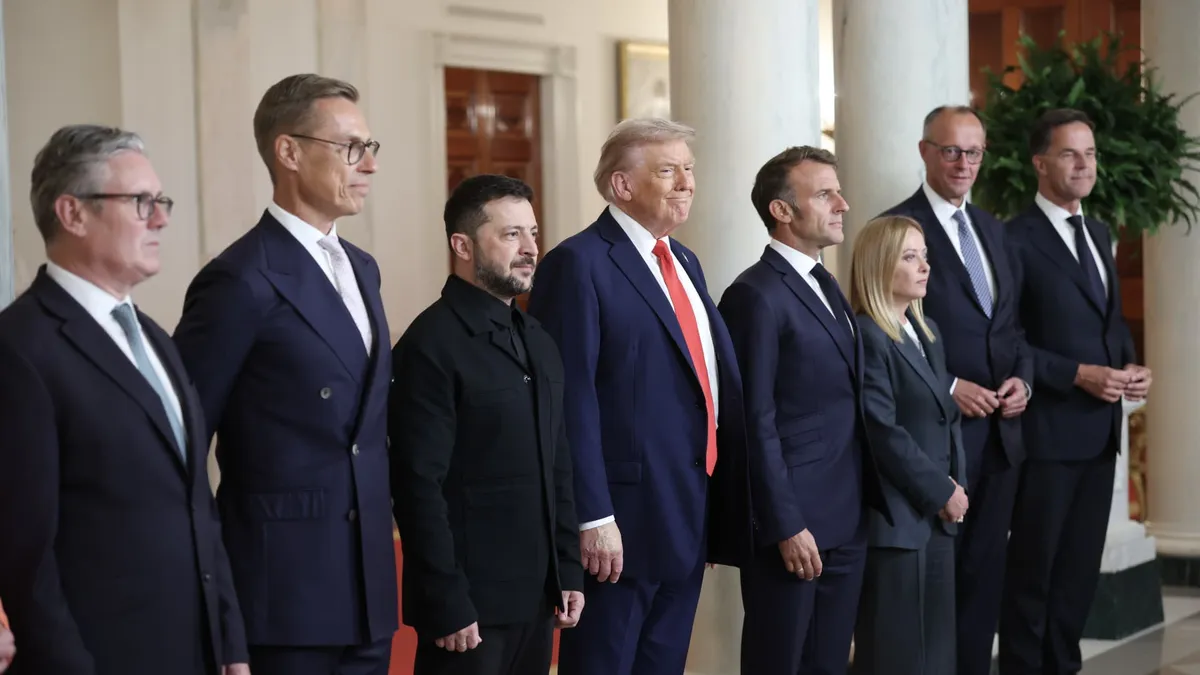
In a recent meeting, Merz expressed that all leaders present shared a desire for a ceasefire in Ukraine. However, the sentiment was met with skepticism from former President Trump, who questioned the German chancellor's assertion. Merz stated, "The way is open for complicated negotiations. And to be honest, we all would like to see a ceasefire. The latest from the next meeting on, I can't imagine that the next meeting would take place without a ceasefire, so let's work on that, and let's try to put pressure on Russia," highlighting the collective hope for peace.
Trump responded by suggesting that discussions between Zelenskyy and Putin would determine the future of the conflict. He remarked, "In the six wars that I have settled, I haven't had a ceasefire... So if we can do the ceasefire, great, and if we don't do a ceasefire, because many other points were given to us, many, many points were given to us, great points." The former President reiterated his stance against a temporary ceasefire, aligning with Russia’s position against such a halt in hostilities.
Trump indicated that he intends to call Putin directly following his meetings with Zelenskyy and other European leaders. "I just spoke to President Putin indirectly, and we're going to have a phone call right after these meetings today," Trump said during a press briefing in the Oval Office. He emphasized the potential for a trilateral meeting involving Russia, Ukraine, and the U.S., suggesting that such a dialogue could pave the way towards ending the war.
Despite expressing hope for a ceasefire in the lead-up to his summit with Putin, Trump has increasingly advocated for a direct Peace Agreement instead. He stated, "We can work a deal where we're working on a peace deal while they're fighting," underlining a belief that a ceasefire may not be strategically beneficial for either side.
Prior to arriving at the White House, Zelenskyy emphasized the unity of European leaders in their pursuit of lasting peace. "Together with the leaders of Finland, the United Kingdom, Italy, the European Commission, and the NATO Secretary General, we coordinated our positions ahead of the meeting with President Trump," he shared on social media. Zelenskyy stressed the importance of joint pressure from the U.S. and Europe to counter Russian aggression.
These meetings occurred shortly after Trump and Putin's lengthy discussions in Anchorage, Alaska, which concluded without the desired ceasefire. Trump stated, "There's no deal until there's a deal," and later expressed on Truth Social that moving towards a Peace Agreement would be more effective than pursuing a ceasefire, which he deemed often ineffective.
Foreign policy analysts, like Michael O'Hanlon from the Brookings Institution, suggest that convincing Zelenskyy to agree to a land swap for peace may be a significant hurdle in the negotiations. O'Hanlon noted, "European leaders are pragmatic enough to know that Ukraine's not going to win back all of its land," indicating a complex landscape for any potential agreements.
Meanwhile, oil prices have shown minimal fluctuation ahead of Trump's discussions, as investors await updates on Russia's war in Ukraine, which could impact global energy markets. Trump's recent summit did not yield a ceasefire, and while he has reduced threats of new sanctions against Russia, he has imposed higher tariffs on India for purchasing Russian oil.
UK Prime Minister Starmer voiced his concerns about the prolonged conflict in Ukraine, stating, "This war in Ukraine's been going on a really long time now, I mean, three-plus years... But we've got to get this right. We've got to make sure there is peace, that it is lasting peace." His comments reflect a broader European sentiment aimed at achieving a just resolution to the ongoing crisis.
As European leaders gather in Washington, it is noteworthy that this meeting is unusual due to the number of leaders attending simultaneously, each having previously met with Trump during his current term. Trump, facing ongoing scrutiny for his prior meeting with Putin, expressed frustration over the media's portrayal of the situation, asserting, "If Russia raised their hands and said, 'We give up... the Fake News Media and their Democrat Partners would say that this was a bad and humiliating day for Donald J. Trump."
Hours before the crucial meeting, Zelenskyy accused Russia of targeting civilians to undermine peace talks. He highlighted recent attacks that claimed lives and damaged infrastructure, emphasizing the need for robust security guarantees. "The war must be ended. And it is Moscow that must hear the word: 'Stop,'" he declared, reinforcing the urgency for international cooperation to resolve the conflict.